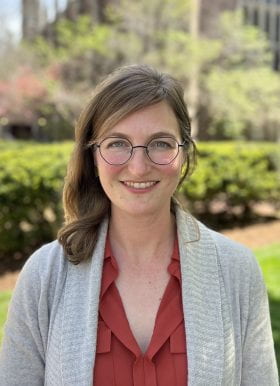
Kate Harnish
Graduate Support Coordinator
- BA in Psychology and Art, Goshen College
- MA in Art History, Indiana University
- PhD in Art History, Washington University in St. Louis
Dr. Harnish began tutoring at The Writing Center as a graduate fellow in 2017. As a doctoral student in Art History, she received the Dean’s Award for Teaching Excellence. After graduating, she worked for a few years at the Pulitzer Arts Foundation in the curatorial department, where she supported the writing and editing of a wide range of materials including a peer-reviewed book. She returned to WashU and The Writing Center in 2021 as a Senior Tutor and now serves as Graduate Support Coordinator.
In addition to her work at The Writing Center, Dr. Harnish also teaches Technical Writing with the Engineering Communication Center.
What brought you to The Writing Center?
Initially, I wanted to learn more about resources for my students, so I went to a panel where The Writing Center director was one of the speakers. At one point during his presentation, the director said that grad students who work with The Writing Center finish their degrees. This caught my attention. I decided to get more involved. In my first session, it became clear to me that I could learn so much here—about the writing process, of course, but also about teaching and mentoring.
What do you like most about working with writers at The Writing Center?
I love getting to know the writers and figuring out how to help them find their own way forward. Each writer, each project, each session is different. This means I have to be creative and improvisational, and I find that really exhilarating.
What do you find most challenging about writing?
You know when you’ve been working on a piece of writing for so long that you have no idea if what you’re saying makes any sense? And it feels like your eyes are going to fall out? That part.
What advice do you have for writers?
Find ways to take the pressure off. You are (I assume) a human being, so you’re going to make mistakes. Give yourself the space and grace to do so. Start early. Let yourself write a VERY rough draft where it’s okay to just figure out your ideas. And talk to people. Writing is about communicating, usually with other people, so it really helps to get different perspectives.